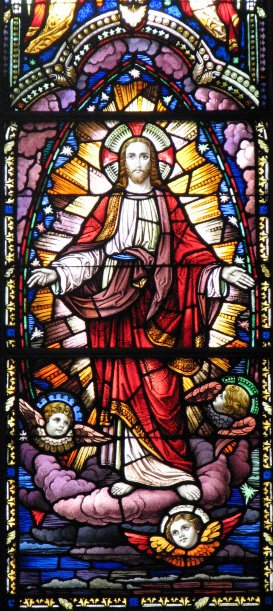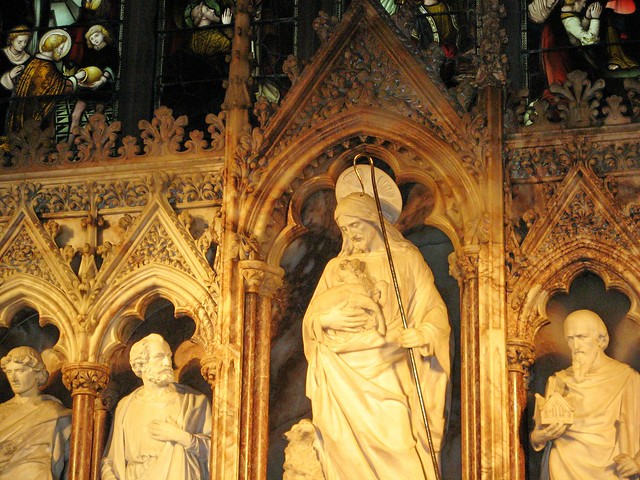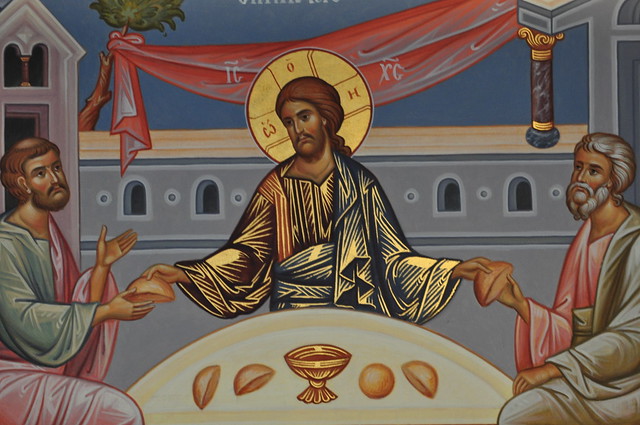The Gospel for today’s Mass features two hard sayings, or expressions, of the Lord. They are “hard” because they offend against a modern notion. And since they are difficult for us “moderns” to hear and we are easily taken aback by their abrupt and coarse quality. Here is the “offending verse:
Do not give what is holy to dogs, or throw your pearls before swine, lest they trample them underfoot, and turn and tear you to pieces.” (Mt 7:6)
The modern notion offended against here is: You’re not supposed to call people ugly names. This notion, though not wrong in itself, has become a rather excessively applied norm in our times and also misses the point in terms of this passage. We live in dainty times where many people are easily offended. These are thin-skinned times of fragile egos where the merest slight often brings threats of lawsuits. Even observations intended as humor are excoriated and hurtful and out of line. And so, horror of horrors, here we have Jesus calling certain (unnamed) people dogs and swine! Explanations are demanded in times like these of such horrible words coming forth from the sinless Lord Jesus.
Sophistication is needed – One of the reasons we are so easily offended in our modern age is, frankly, that we lack sophistication. We seem to have lost understanding, to a great extent, of simile and metaphor.
A simile is a figure of speech comparing two unlike things and normally includes words such as “like” and “as.” For example: “He is as swift and strong as a horse!” Similes have the two ideas remain distinct in spite of their similarities.
Metaphors compare two things without using “like” or “as”. For example, “He’s a real work-horse!” Metaphors are usually more forceful than similes since the distinction intended between the compared things is often ambiguous. For example if I were to observe someone doing something mean or cruel I might say, “Wow, what a dog!” Now the expression does not mean I have gone blind and think that this person is actually a dog. I mean that he is manifesting qualities of a (wild or mean) dog. However, just how distinct he is from an actual dog is left open to interpretation. But for the record, I am NOT saying he is a dog.
The point here is that some sophistication and appreciation for the nuances of language and the art of comparison are necessary as we negotiate life’s road. In modern times we seem to have lost some of this and so, are easily offended.
This does not mean that no one ever intends offense, it only means that more is necessary than simply hearing everything in a crudely literal way. The usual modern person in my example would object, “Hey, he called me a dog!” No, what he means is that you have taken on some of the qualities of a wild dog. Now to what extent he means you are like a dog is intentionally ambiguous and an invitation for you to think of how you may have surrendered some of your humanity and become more like baser creatures.
Examining what the Lord says – This sort of sophistication is necessary as we examine two of the Lord’s “offensive” sayings here. Let’s look at them both in terms of their historical root and then to what is being taught.
1. First of all let’s be clear that the Jewish people were not indicating positive traits when they used the term dog or swine to refer to someone. Dogs in the ancient world were not the pets of today. They were wild, and ran in packs. Pigs were unclean animals and something no Jew would ever touch, let alone eat. These are strong metaphors indicating significant aversion to some aspect of the person.
2. Do not give what is holy to dogs– This was a Jewish saying that was rooted in tradition. Some of the meat that had been sacrificed to God in the Temple could be eaten by humans, especially the Levites. But in no way was it ever to be thrown to dogs or other animals to eat. If it was not eaten by humans it was to be burned. Hence holy and sanctified meat was not to be thrown to dogs because it was holy.
3. [Do not] throw your pearls before swine, lest they trample them underfoot – Pearls were an image for wisdom in the Old Testament. Now the point here is that pigs valued nothing they could not eat. Pearls could not be eaten, thus if they were placed before pigs they would sniff them, determine they were not food, and simply trample them underfoot.
4. So what is being said? Sacred matters, sacred things, wisdom, and participation in sacred things should not be easily offered to those who are incapable of appreciating them. There are those who despise what we call holy. There is little that can be done in such cases except deny them the pleasure of tearing apart holy things or trampling them underfoot. Jesus is saying that some people are like dogs who tear apart sacred things and have no concept of their holiness. Some people are like pigs who do not appreciate anything they cannot eat or use for their pleasure. They simply trample under foot anything that does not please them or make sense to them in the same way that pigs would trample pearls underfoot or dogs irreverently tear apart blessed food dedicated to God.
Further, there are some who, though not hostile, are ignorant of sacred realities. They do not perhaps intend offense but it is necessary that they should be taught and then admitted to sacred rites or further instructed on deeper mysteries. Children, for example in the Western Rite, are not given the Holy Eucharist until they can distinguish it from ordinary food. Further, it is a necessary truth that some more advanced spiritual notions such as contemplative prayer are not often appreciated by those who have not been led there in stages.
The Lord is thus indicating that holy things are to be shared in appropriate ways with those who are able to appreciate them. It is usually necessary to be led into the Holy and just walk in unprepared or unappreciative.
In the ancient Church there was something known as the disciplina arcani (discipline of the secret) wherein only the baptized and confirmed would be admitted to the sacred mysteries of the Liturgy. Given the holiness with which the early Christians regarded the Mass, they exactly observed what the Lord is saying here. Careful instruction and gradual introduction to sacred truth was necessary before entering something so holy as the Sacred Liturgy. Even the unintentional trampling underfoot of sacred realities through simple ignorance was to be strictly avoided. To be sure, these were difficult times for the Church and persecution was common. Hence the Lord’s warning to protect the holy things was not just that they might be trampled underfoot but also that those who were like unto wild dogs and swine might not turn and tear you to pieces (Mat 7:6).
In the centuries after the Edict of Constantine the disciplina arcani gradually dissipated. Some remnants of it revived in the modern RCIA wherein the Catechumens are dismissed halfway through the Mass to reflect more fully on the Liturgy of the Word. And yet we have much to relearn in modern times about a deep reverence for the Sacred Liturgy. It would NOT seem opportune to lock our Church doors as in ancient times. But preserving good order in the Liturgy, encouraging reverence, proper dress, and instilling deeper knowledge of the true meaning of the Sacred Liturgy are all important ways to ensure that we do not trample underfoot what is sacred.
The Third Hard Saying destroys a notion that is to most moderns a dogma. The “dogma” is that just about everyone is going to heaven. It is one of the most damaging notions of modern times since it removes a sense of urgency in earnestly seeking our salvation and staying on the narrow road that leads to salvation. Against this destructive and presumptive notion of practically universal salvation Jesus says,
Enter through the narrow gate; for the gate is wide and the road broad that leads to destruction, and those who enter through it are many. How small the gate and narrow the road that leads to life. And those who find it are few (Matt 7:12-13).
Do you see that word: few. We need to sober up and come to a biblical understanding that our salvation must be earnestly desired and sought. God’s love for us is not lacking, but our love for him often is. “Many” says Jesus are on a path of indifference or outright rejection of the kingdom.
Now the Kingdom of God is not some abstraction, or some golf course, or playground in the sky. The Kingdom of God is the full realization of God’s plan and will. It includes Kingdom values like justice, love of the poor, mercy, kindness, chastity, love of God and neighbor, the praise of God, rejoicing in the truth of God’s word, and so forth. It is clear that many (to quote Jesus) live in opposition or indifference to these values. Only a few, (to quote Jesus) come to appreciate and are willing to receive these into their life wholeheartedly.
Yes, this is a hard saying of Jesus. Many are on the path to destruction, only a few in the road to salvation. The Lord is telling us the truth, not to panic us, but to sober us into earnestly desiring our own salvation and seeking it from God with devotion. It is also to make us sober and urgent about the condition of others, to stop making light of sin and indifference and to work hard to evangelized and call sinners to repentance.
We need to realize that our tendency and that of others is to turn away from God. There is a great drama to our lives and we are either on one road or the other. No third way is given. Not a popular teaching to be sure. It offends modern notions. But it is true because Jesus says it to us in love.
And old song says: Sinner please don’t let this harvest pass, and die and lose your soul at last.
Photo Credit © Copyright Bryan Pready and licensed for reuse under this Creative Commons License.

 In more dioceses than not, the Feast of the Ascension is celebrated this weekend. The liturgist in me regrets the move, but here we are any way. So let’s ascend with the Lord, three days late!
In more dioceses than not, the Feast of the Ascension is celebrated this weekend. The liturgist in me regrets the move, but here we are any way. So let’s ascend with the Lord, three days late! The Fourth Sunday of Easter is traditionally called Good Shepherd Sunday, for the readings focus on how our risen Lord Jesus is our shepherd who leads us to eternal life. But of course, the flip side of the Lord being our shepherd, is that we are sheep. We sometimes miss the humor of the Lord calling us sheep. The Lord could have said we were strong and swift as horses, beautiful as gazelles, or brave as lions. But, instead, he said we are like sheep. I guess I’ve been called worse, but it’s a little humbling and embarrassing really. And yet sheep are worthwhile animals and they have a certain quality that makes them pretty smart, as we shall see. Are you smarter than a sheep? Well, lets look and see how we stack up as we look at this gospel in three stages.
The Fourth Sunday of Easter is traditionally called Good Shepherd Sunday, for the readings focus on how our risen Lord Jesus is our shepherd who leads us to eternal life. But of course, the flip side of the Lord being our shepherd, is that we are sheep. We sometimes miss the humor of the Lord calling us sheep. The Lord could have said we were strong and swift as horses, beautiful as gazelles, or brave as lions. But, instead, he said we are like sheep. I guess I’ve been called worse, but it’s a little humbling and embarrassing really. And yet sheep are worthwhile animals and they have a certain quality that makes them pretty smart, as we shall see. Are you smarter than a sheep? Well, lets look and see how we stack up as we look at this gospel in three stages. In today’s gospel we encounter two discouraged and broken men making their way to Emmaus. The text described them as “downcast.” That is to say, their eyes are cast to the ground, their heads are hung low. Their Lord and Messiah has been killed; the one they had thought would finally liberate Israel. Yes, it is true, some women had claimed he was alive, but these disciples have discredited the reports and are now leaving Jerusalem. It is late in the afternoon. The sun is sinking low.
In today’s gospel we encounter two discouraged and broken men making their way to Emmaus. The text described them as “downcast.” That is to say, their eyes are cast to the ground, their heads are hung low. Their Lord and Messiah has been killed; the one they had thought would finally liberate Israel. Yes, it is true, some women had claimed he was alive, but these disciples have discredited the reports and are now leaving Jerusalem. It is late in the afternoon. The sun is sinking low.